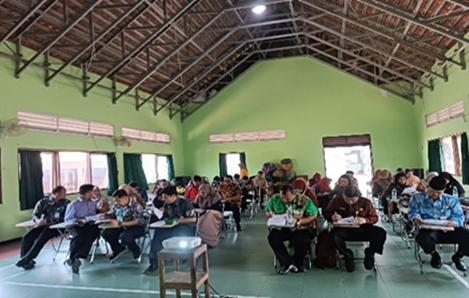Pelatihan Manajemen Kelas Efektif guna Meningkatkan Kualitas Pembelajaran pada Era Merdeka Belajar Effective Classroom Management Training to Improving Learning Quality in the Merdeka Belajar Era’s
Main Article Content
Abstract
Class management is one of the supporting aspects of the good learning process. Good management produces a conducive learning environment for both students and teachers. The new learning paradigm in the Merdeka Belajar curriculum means that teachers, as learning leaders, must be able to create safe, comfortable, and enjoyable classes. The problem with partners is that classroom management still needs to be optimal because teachers' knowledge and understanding regarding effective classroom management are not optimal. Teacher's understanding of effective classroom management is arranging students' seats. The psychological approach of students still needs to be fully understood and implemented by teachers in classroom management. The Universitas Tidar community service team is trying to solve problems at the two partners through an effective classroom management training program. Class management is physical and managing students and their social learning environment. Therefore, training is needed to improve classroom management skills effectively. The subjects of this training were teachers at SMP Negeri 3 and SMP Negeri 9 Kota Magelang. The approach used is a classical approach. The method of implementing service activities is through lectures and discussions. The results of service activities are that teachers gain new knowledge regarding effective classroom management, and teachers' skills increase in managing classes according to student's needs.
Downloads
Article Details

This work is licensed under a Creative Commons Attribution-ShareAlike 4.0 International License.
Authors who publish with this journal agree to the following terms:
- Any article on the copyright is retained by the author(s).
- Author grant the journal, right of first publication with the work simultaneously licensed under a Creative Commons Attribution License that allows others to share work with acknowledgment of the work authors and initial publications in this journal.
- Authors are able to enter into a separate, additional contractual arrangements for non-exclusive distribution of published articles of work (eg, post-institutional repository) or publish it in a book, with acknowledgment of its initial publication in this journal.
- Authors are permitted and encouraged to post their work online (e.g., in institutional repositories or on their websites) prior to and during the submission process, as can lead to productive exchanges, as well as earlier and greater citation of published work.
- The article and any associated published material is distributed under the Creative Commons Attribution-ShareAlike 4.0 International License
References
Aprilia, B. F., & Trihantoyo, S. (2020). Strategi Manajemen Kelas Dalam Meningkatkan Efektifitas Pembelajaran. Jurnal Inspirasi Manajemen Pendidikan, 08(04), 434–449.
Arfani, J. W., & Sugiyono, S. (2014). Manajemen Kelas Yang Efektif: Penelitian Di Tiga Sekolah Menengah Atas. Jurnal Akuntabilitas Manajemen Pendidikan, 2(1), 44–57. https://doi.org/10.21831/amp.v2i1.2408
Arismunandar, A., & Nurhikmah, H. (2019). Manajemen kelas bagi Guru SMA Insan Cendekia Syech Yusuf Kabupaten Gowa. Seminar Nasional Pengabdian Kepada Masyarakat 11, 713–714. Diambil dari https://ojs.unm.ac.id/semnaslpm/article/download/11900/7010
Astuti. (2019). Manajemen Kelas Yang Efektif. Manajemen Pendidikan Islam, 9(2), 892–907. https://doi.org/10.35673/ajmpi.v9i2.425
Astuti, T., Suyahmo, S., Masrukhi, M., & Ngabiyanto, N. (2022). Pembelajaran Paradigma Baru pada Era Digital di Sekolah Multi Etnik. Prosiding Seminar Nasional Pascasarjana (PROSNAMPAS), 5(1), 1101–1105. Diambil dari https://proceeding.unnes.ac.id/index.php/snpasca/article/view/1623
Haryono, A. (2015). Paradigma Baru Dalam Proses Pembelajaran Konsep, Praktek, dan Permasalahannya. Jurnal Manajemen Pendidikan. Jurnal Manajemen Pendidikan 4(2), 171–186
Jusuf, H., & Sobari, A. (2022). Pembelajaran Paradigma Baru Kurikulum Merdeka Pada Sekolah Dasar. Jurnal Pengabdian Kepada Masyarakat UBJ, 5(2), 185–194. https://doi.org/10.31599/jabdimas.v5i2.1360
Karkono, K., Zen, E. L., Zandra, R. A., Safii, M., Sari, B. A. G., & Nisa’, L. F. (2022). Penguatan Self-Efficacy dan Self-Esteem siswa SMA Laboratorium UM dalam meraih prestasi. ABSYARA: Jurnal Pengabdian Pada Masyarakat, 3(2), 226–235. https://doi.org/10.29408/ab.v3i2.7220
Maurin, H., & Muhamadi, S. I. (2018). Metode Ceramah Plus Diskusi dan Tugas Untuk Meningkatkan Aktivitas Belajar Siswa. Al-Aulad: Journal of Islamic Primary Education, 1(2), 65–76. https://doi.org/10.15575/al-aulad.v1i2.3526
Nurhaliza, Lestari, E. T., & Irawani, F. (2021). Analisis Metode Ceramah dalam Pembelajaran IPS Terpadu di Kelas VII SMP Negeri 1 Selimbau Kabupaten Kapuas Hulu. Jurnal Pendidikan Sejarah, Budaya Sosial, 1(2), 11–19. Retrieved from =
Paristiowati, M., Asrul Ashmi Karepesina, M., & Umayah, A. (2022). Pelatihan Model Pembelajaran Daring untuk Meningkatkan Kompetensi Guru di Kabupaten Bekasi. ABSYARA: Jurnal Pengabdian Pada Masyarakat, 3(1), 9–16. https://doi.org/10.29408/ab.v3i1.5117
Purba, D. S., Purba, R., Sipayung, T., Girsang, R. M., & Saragih, M. (2022). Pelatihan analisis SWOT untuk memahami kondisi internal dan eksternal. ABSYARA: Jurnal Pengabdian Pada Masyarakat, 3(1), 117–128. https://doi.org/10.29408/ab.v3i1.5852
Rafikayati, A., Badiah, L. I., Alifah, F. D., & Salsabila, I. B. (2022). Pelatihan Implementasi Kurikulum Merdeka Di Sekolah Inklusi. Kanigara, 2(2), 478–485. https://doi.org/doi.org/10.36456/kanigara.v2i2.6274
Salabi, A. (2016). Konsepsi Manajemen Kelas: Masalah Dan Pemecahannya. Jurnal Tarbiyah (Jurnal Ilmiah Kependidikan). 5(2), 69–78. https://doi.org/10.18592/tarbiyah.v5i2.985
Susanti, A. E. (2020). Pelatihan Manajemen Kelas Bagi Guru Untuk Mencapai Tujuan. Prosiding PKM-CSR, 3, 705–711. https://doi.org/doi.org/10.37695/pkmcsr.v3i0.773
Wahira, W., Hamid, A., & HB, L. (2023). Pelatihan Pemahaman Kurikulum Merdeka Belajar Pada Guru Sekolah Dasar. EJOIN : Jurnal Pengabdian Masyarakat, 1(2), 43–47. https://doi.org/10.55681/ejoin.v1i2.572
Yestiani, D. K., & Zahwa, N. (2020). Peran Guru dalam Pembelajaran pada Siswa Sekolah Dasar. Fondatia, 4(1), 41–47. https://doi.org/10.36088/fondatia.v4i1.515
